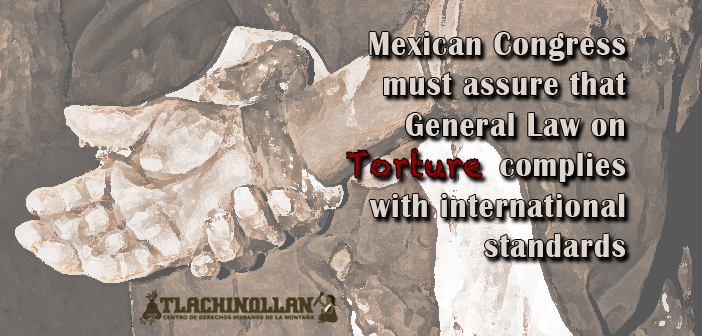-
Civil society organizations highlight essential provisions that must be included in the General Law against Torture
-
The Law must be designed to prevent, punish, and eradicate torture, ending the endemic impunity that prevails for this practice in Mexico
-
Also essential that the National Law on Execution of Judgments include provisions to prevent torture
Mexico City, February 3, 2016.- In Mexico, torture has long been a tool for coercing information, for inventing confessions, and for punishing, sexually abusing, and breaking the will of thousands of people who live or transit through the country. Numerous international bodies, such as the UN Committee against Torture and Special Rapporteur on Torture and other cruel, inhuman, and degrading treatment, have found torture to be a widespread or systematic practice here.
In this context, in October 2015, Mexico’s federal government carried out a public consultation through its Attorney General’s Office (PGR), in which the PGR, civil society organizations, academic experts and other stakeholders agreed on certain minimum contents that a General Law against Torture should contain in order to be effective, as well as specific language for the law. While not all civil society proposals were incorporated, the outcome document reflected the actions needed to prevent, punish, and eradicate torture in Mexico.
However, on December 10, 2015, Mexico’s President sent his official proposal for the law to the Senate, erasing various essential components of the text and adding new language that would promote the continued commission of torture with impunity. Thus, the official proposal does not provide for real advances in the eradication of torture in Mexico.
We take this opportunity to highlight the essential topics that must be included in the General Law:
- Inadmissibility of all evidence obtained through torture and cruel, inhuman, or degrading treatment. The official proposal is unacceptable, as it allows for the admissibility of evidence in these circumstances, despite the absolute prohibition on the use of such evidence, established in international law and recognized by Mexico’s own Supreme Court.
- Cruel, inhuman, and degrading treatment should have the same consequences and give rise to the same obligations as torture (exclusion of evidence, investigation, victim protection, etc.)
- The Istanbul Protocol should be the standard for documenting torture, especially the physical and psychological signs of this practice. Independent experts should be able to document the physical and psychological impact of torture; at the same time, all evidence of torture should be considered (not exclusively medical evidence). The official proposal continues to envision the use of government medical evaluations that generally do not conform to the Istanbul Protocol as the standard for investigating torture. The proposal would impose excessive requirements on independent experts, even when in practice these experts’ medical and psychological documentation tends to be more rigorous and in line with the Istanbul Protocol.
- Punishment for all perpetrators of torture through the chain of command. The official proposal limits criminal responsibility to material authors and “immediate superiors” only. In addition, the law should exclude the possibility of amnesties, immunity, pardon and other such concepts for those sentenced or charged.
Finally, we are concerned at the official proposal for Mexico’s National Torture Prevention Mechanism to continue operating as part of the government’s system of human rights commissions, a model that has proven ineffective against torture and deplorable conditions of detention since 2007. The General Law should establish a model of effective and independent monitoring of conditions of detention in order to eradicate torture.
We emphasize that clear international standards on all of these points exist in treaties ratified by Mexico, which have been explained in international jurisprudence, such as that of the Inter-American Court of Human Rights. These standards should be the starting point for the torture law.
We also take this opportunity to express concern over the discussion of a related law, the National Law on Execution of Judgments (also pending in the Senate). This related law must ensure that Execution Judges have full authority to guarantee adequate conditions of detention, that detainees and their visitors and lawyers have access to legal remedies to denounce abuses, and that independent organizations and journalists can access prisons. Otherwise, this law will undermine any positive provisions in the General Law against Torture with regard to places of detention.
With the Senate opening its period of work this week, we call on legislators to incorporate civil society and academic experts’ observations and proposals in order to pass a General Law against Torture in accordance with international standards, with the aim of ending the generalized practice of torture and cruel, inhuman, and degrading treatment in Mexican territory.
Signatory organizations:
Asistencia Legal por los Derechos Humanos (ASILEGAL)
Asociadas por lo Justo (JASS)
Asociación de Familiares de Detenidos Desaparecidos y Víctimas de Violaciones de Derechos Humanos en México (AFADEM-FEDEFAM)
Centro de Derechos Humanos de la Montaña Tlachinollan
Centro de Derechos Humanos de las Mujeres (CEDEHM)
Centro de Derechos Humanos Fray Bartolomé de las Casas
Centro de Derechos Humanos Fray Francisco de Vitoria
Centro de Derechos Humanos Miguel Agustín Pro Juárez (Centro Prodh)
Centro de Derechos Humanos Paso del Norte
Centro de Derechos Humanos Zeferino Ladrillero
Centro de Justicia para la Paz y el Desarrollo (CEPAD)
Ciudadanos en Apoyo a los Derechos Humanos (CADHAC)
Colectivo Contra la Tortura y la Impunidad (CCTI)
Comisión Independiente de Derechos Humanos de Morelos
Comisión Mexicana de Defensa y Promoción de los Derechos Humanos (CMDPDH)
Comité de Defensa Integral de Derechos Humanos Gobixha (Código DH)
Documenta, Análisis y Acción para la Justicia Social
Equis, Justicia para las Mujeres
Fundación para el Debido Proceso (DPLF)
Fundar, Centro de Análisis e Investigación
I(dh)eas, Litigio Estratégico en Derechos Humanos
Indignación – Promoción y Defensa de los Derechos Humanos
Instituto de Justicia Procesal Penal (IJPP)
Instituto Mexicano de Derechos Humanos y Democracia (IMDHD)
Instituto para la Seguridad y la Democracia (INSYDE)
Programa de Derechos Humanos de la Universidad Iberoamericana, Ciudad de México
Red Nacional de Organismos Civiles de Derechos Humanos, Todos los Derechos Para Todas y Todos (REDTDT)
